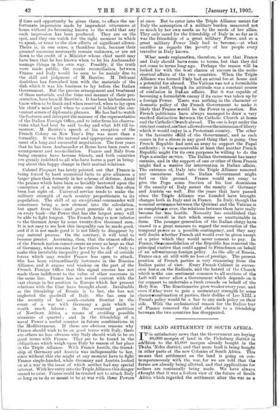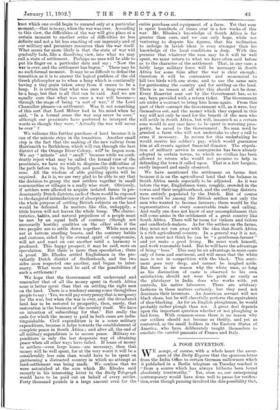TRiF1 LAND SETTLEMENT IN SOUTH AFRICA.
Ir.is satisfactory news that the Government are buying 80,000 morgen of land in the Ficksburg district in add Lion to the 45,000 morgen already bought in the Thaba 'Nchu district, and that more land is being bought in other parts of the new Colonies of South Africa. This moans that settlement on the land is going on con- temporaneously with the war, for we are told that the farms are already being allotted, and that applications for 'others are continually being made. We have always ithought that it was a forlorn view of the future of South Africa which regarded the settlement after the war as a knot which one could begin to unravel only at a particular moment,—that is to say, when the war was over. According to this view, the difficulties of the war will giie place at a certain moment to another series of difficulties no less definite and not a bit less exacting of our ingenuity and of our military and pecuniary resources than the war itself. What seems far more likely is that the state of war will gradually fade, like a dissolving view, into what we may call a state of settlement. Perhaps no man will be able to put his finger on a particular date and say " Now the war is over, and the settlement has begun." There may be no such formal moment. It may be as difficult to define the transition as it is to answer the logical problem of the old Greek philosopher as to when a heap which is continually having a tiny grain taken away from it ceases to be a heap. It is certain that what was once a heap ceases to be.a heap, but that is all that can be said. And we are equally sure that what was once a war will become— through the stage of being "a sort of war," if the Lord Chancellor pleases—a settlement. Was it not something of this sort that Lord Milner had in his mind when he said, " In a formal sense the war may never be over," although our pessimists have preferred to interpret the words as though they were, " Actually the war will never be over ?
We welcome this further purchase of land because it is one of the minute steps in the transition. Another small step is the fact that the making of the new railway from Harrismith to Bethlehem, which will run through the best district of the Orange River Colony, will° be begun soon. We say " minute " and " small " -because while we confi- dently reject what may be called the formal view of the pessimists, we have no wish to disguise the difficulties of the path before us, its length, and possibly its tortuous- ness. All the wisdom of able guiding 'spirits will be required. As it is, we are very glad to be able to say that the decision to group the new settlers together in small communities or villages is a really wise start. Obviously, if settlers were allowed to acquire isolated farms in pre- dominantly Dutch districts, each of them would be exposed to the dangerof intimidation or of absorption. In either case the whole purpose of settling British subjects on the land would be defeated. In matters like this, unhappily, a little leaven will not leaven the whole lump. 1-she charac- teristics, habits, and natural prejudices of a people must be met by an equal bulk of contrary (though not necessarily hostile) qualities on the other side if the two peoples are to settle down together. White men are not at bottom snarling beasts, and the contrary habits and customs, aided by the eternal spirit of compromise,' will act and react on one another until a harmony is produced. This happy prospect, it may be said, rests on speculation. But there is more than speculation ; there is proof. Mr. Rhodes settled Englishmen in the pre- valently Dutch district of Stellenbosch, and the two sides soon respected one another, and began to inter- marry. What more need be said of the possibilities of such a settlement ?
- We hope that the Government will understand and remember that of all the money spent in South Africa none is better spent than that on settling the right men on the land. There is a tendency among some thoughtless people to say : 'Yes, wewill pay every penny that is necessary for the war, but when the war is over, and the devastated land has to be restored to prosperity, then, surely, that restoration is the business of the country itself. We have no intention of subscribing for that.' But really* the ends for which the money is paid in both cases are indis- tinguishable. Civil expenditure is in a sense military expenditure, because it helps towards the establishment of complete peace in South Africa ; and after all, the end of all military expenditure is to secure peace. Military ex- penditure is only the last desperate way of obtaining peace when all other ways have failed. If loans of money to settlers—even large loans—are necessary, then that money will be well spent, for at the very worst it will be a considerably less sum than would have to be spent on garrisoning a distracted country in which no attempt. at land-settlement was being made. We confess that we were astonished at the sum which Mr. Rhodes said recently in his interesting letter to the Daily Telegraph would have to be paid out on behalf of every settler. Forty thousand pounds is a large amount even for the entire purchase and equipment of a farm. Yet that sum is spent hundreds of times over in a few weeks of this war. Mr. Rhodes's knowledge of South Africa is far greater than ours, and we can only hope, while not venturing to dispute his figures, that his inclination to indulge in lavish ideas is even stronger than his knowledge of the local conditions is deep. With this premiss that whatever the sum may be it will be well spent, we must return to what we have often said before as to the character of the settlement That, in any case, a fairly large military force will be necessary in South Africa for some time after the war is clear enough ; therefore it will be convenient and economical to kill two birds with one stone, and to use the same men for garrisoning the country and for settling on the land. There is no reason at all why this should not be done. Every Reservist sent out by the Government has, so to say, been provided with a return. ticket. The Government are under a contract to bring him home again. From this part of their contract the Government will, as it were, buy themselves out, and the money which they expend in this way will not only be used for the benefit of the men who will settle in South Africa, but will, inasmuch as a certain sum would in any case have to be spent in restoring pros- perity, be saved to the Government. No man need be granted a farm who will not undertake to obey a call to arms if necessary. In return for this undertaking he would receive his soldier's pay, which would guarantee him at all events against financial disaster. The stipule; tion of military service in emergencies has been already adopted in certain towns, to which no civilian has been allowed to return 'who would not promise to help in defending the town if called upon. That is a fair bargain, easily imposed and easily observed.
We have mentioned the settlement on farms first because it is on the agricultural land that the balance in South Africa needs especially to be adjusted. As it was before the war, Englishmen were, roughly, crowded in the towns and their neighbourhood, and the outlying districts were entirely populated by the Dutch. But of course there would be among the British settlers not only the men who wanted to become farmers; there would be the representatives of every conceivable trade and calling. And really one does not know of any accomplishment that will come amiss in the settlement of a great country like South Africa. There will be room for tinkers and tailors and candlestick-makers. As for the settlers on the farms, they must not run away with the idea that South Africa is a rich agricultural country. In a general way it is not. A man must not think he can be " a gentleman-farmer " and yet make a good living. He must work himself, and work reasonably hard. But he will have the advantage of being " boss." This may be an advantage in most cases only of form and sentiment, and will mean that the white man is not in competition with the black. This senti- ment goes very deep, and cannot be laughed aside. But there is no reason why the white man, so long, as his distinction of caste is observed to his own satisfaction, should not wear his pride as easily as the platelayer in India does who works with, yet controls, his native labourers. There are arbitrary fashions in these matters certainly, but they need not dominate their inventors. An American servant will not black shoes, but he will cheerfully perform the equivalents of shoe-blacking. As for an English ploughman, he would probably rather plough than not. A great deal depends upon the important question whether or not ploughing is bad form. With common-sense there is no reason why our settlers should not become as thrifty, and yet as contented, as the small holders in the Eastern States of America, who have deliberately taught themselves to emulate the careful peasants of France and Italy.







































 Previous page
Previous page